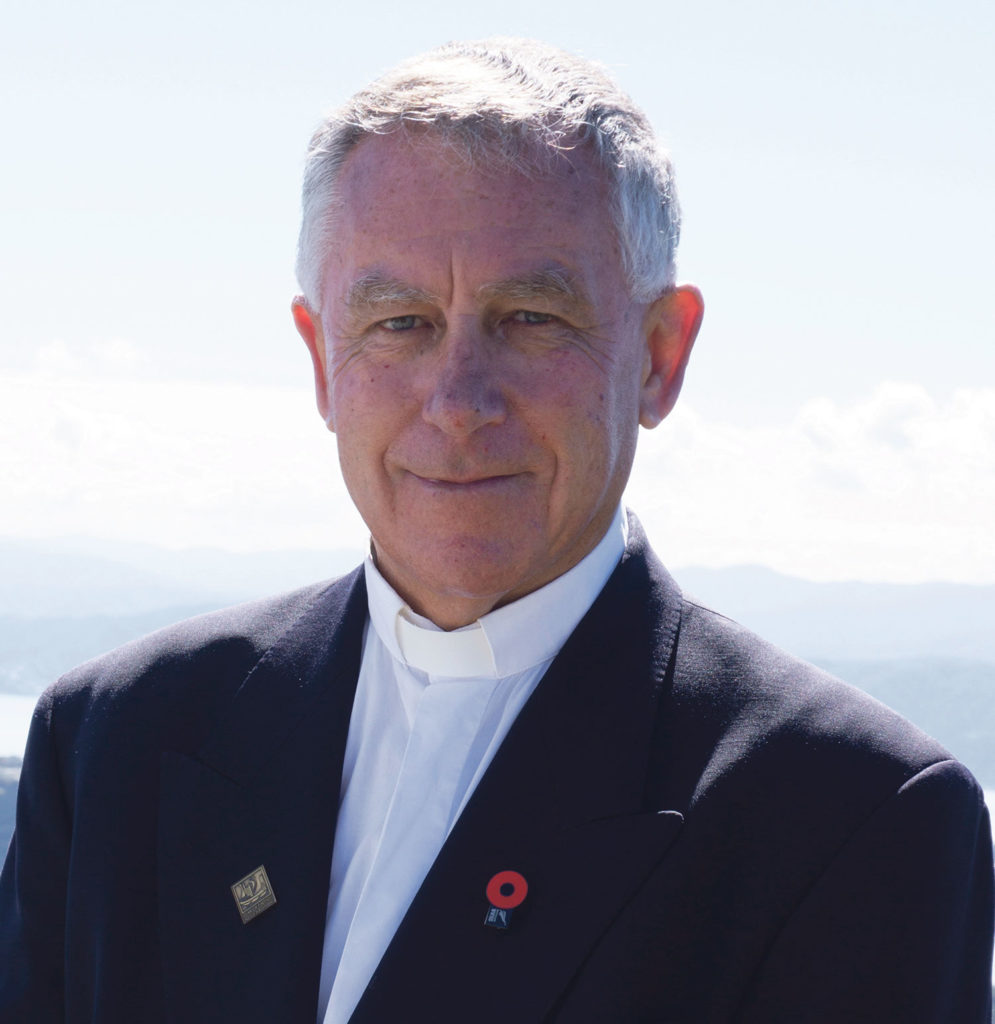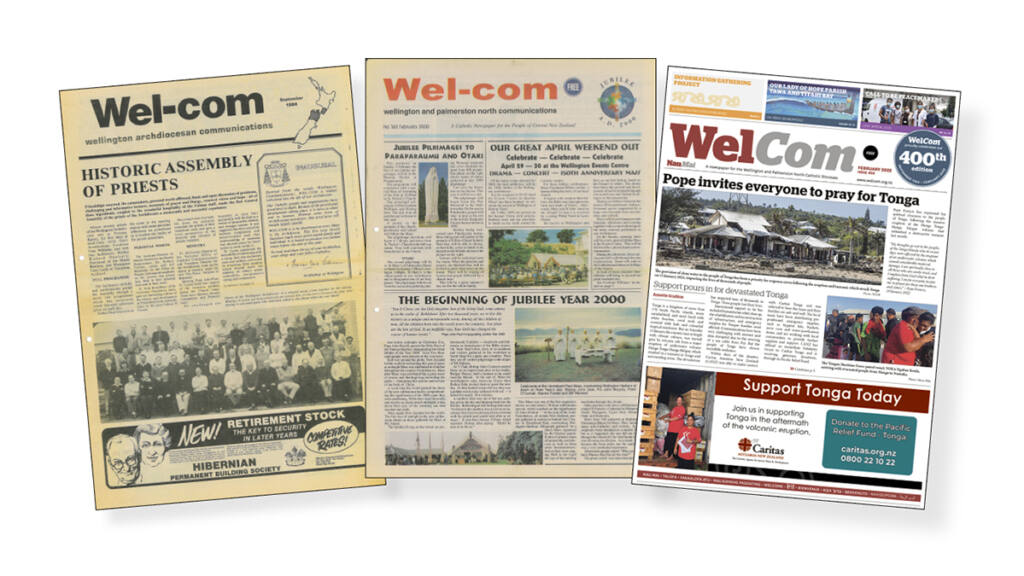
WelCom February 2022
This month, February 2022, WelCom reaches a major milestone with the publication of its 400th edition, after almost four decades since our diocesan newspaper was launched in September 1984.
Creating 400 hundred editions of WelCom is a wonderful effort. The Archdiocese of Wellington and the Diocese of Palmerston North owe an enormous debt of thanks to all those who have been involved in those 400 editions. Clearly the editors – from Fr Bernie Hehir, Marilyn Pryor, Cecily McNeil and now Annette Scullion – have made wonderful contributions. Also to be thanked are the regular and casual contributors to WelCom, the advertisers who contribute enormously to help enable us to keep it going as a free newspaper, those in the parishes and schools who help distribute WelCom because they want to share information about the Wellington and Palmerston dioceses and the wider Church.
The first edition of WelCom was published in September 1984 – WelCom being an abbreviation of Wellington Communications. In 1984, Pope John Paul II had just entered the fifth year of his service as Pope. Cardinal Tom Williams was the archbishop, and it was Cardinal Tom’s vision to establish WelCom to inform, teach, and tell the stories of the archdiocese. Today, the paper still retains the name WelCom, but is shared with the diocese of Palmerston North.
Initially, Cardinal Tom’s aim was to share news of the archdiocese and firstly it was about two specific and related projects – progress reports on the Cathedral strengthening, the additions to the Blessed Sacrament Chapel, the Cathedral Foyer and Connolly Hall; and secondly it was to make public information about archdiocesan finances. The second edition of WelCom included a four-page lift-out with the financial review for 1984 and a budget for 1985. Today, 400 editions later, we are once again strengthening the Cathedral and we are also still looking for finances to complete that.
Over an almost 40-year period WelCom has changed. It has been, and still is, a means for us to share papal letters and encyclicals and encourage others to read, to reflect and pray with messages that come from the Holy Father – particularly Pope Francis in the last nine years. It continues to be a vehicle for sharing the stories of the Archdiocese of Wellington and the Diocese of Palmerston North, so that we can learn from and support one another. WelCom has inspired and educated the people of God, and it still does all those things and for that I am very grateful.
Change in life is constant, and there have been changes in our diocese since the day Bishop Phillipe Joseph Viard arrived in Wellington from France, on 3 May 1850. I have always appreciated the words of St John Henry Newman who said, ‘In a higher world it is otherwise but here below to live is to change, to be perfect is to have changed often’. We know our life consists of change, just as the natural world around us is continually changing with the seasons.
For almost 40 years WelCom has been reporting on the life of the diocese. There have been four Synods, the amalgamation of parishes in recent years and the review of parish properties. The last couple of years have been dealing with the challenges of Covid-19, lockdowns, vaccination passes etc. Our Catholic Schools are in high demand and most of our schools – especially colleges – cannot accept all those who apply for entry. A massive change has been in our clergy numbers. We simply could not manage today without the large number of international priests who generously and willingly serve our two dioceses. At the same time, this situation also gives the opportunity for more and more people to respond to their Baptismal call by being involved in their local parish. In the archdiocese, there has been the advent of Launch Out, and the establishment of Lay Pastoral Leaders. It is inevitable there will be still more changes.
Some things have not changed. We are all the People of God; our Baptism makes us the People of God. Thankfully the emphasis on the fact that we are all the People of God has changed and it is much more appreciated and more clearly understood under the leadership of Pope Francis.
The Church is the People of God. Our Mission has not changed. The Second Vatican Council has been teaching us for 60 years now that the Church is a community of witnesses drawn together by the presence of Jesus. We are inspired by the Word and nourished with the Word and the Eucharist. Our call is to be humble and simple in style, reminding us always that the Mission served is not our own, but the Mission of Jesus himself. Every Catholic parish and school should be seen as a place where we grow in our relationship with God, where individuals work at becoming a community led by the Spirit of God. In these communities we help one another to draw closer to God and to reach others as we try to become more like Jesus himself. Remember, we are pilgrims who are both holy and sinful, and always open to the guidance of the Spirit.
It is in the world around us, with its difficulties, its challenges, its joys and hopes, that we are challenged to be Church. It is in the midst of a broken world that we are to be like Christ as we listen to one another and our world; where we are called to integrate and embrace the Stewardship of Creation and the Common Good emphasised by Pope Francis in his encyclical Laudato si’.
One writer spoke about ‘sniffing out the presence of God’s kingdom’. As we give thanks for 400 editions of WelCom, we pray we will continue to learn from the writing presented in it and that we will continue to grow together as the brothers and sisters we read about in the Acts of the Apostles:
‘The believers devoted themselves to the apostles’ teaching, to the community, to their shared meals, and to their prayers. A sense of awe came over everyone. God performed many wonders and signs through the apostles. All the believers were united and shared everything. They would sell pieces of property and possessions and distribute the proceeds to everyone who needed them. Every day, they met together in the temple and ate in their homes. They shared food with gladness and simplicity. They praised God and demonstrated God’s goodness to everyone. The Lord added daily to the community those who were being saved.’ – Acts 2: 42-47.
